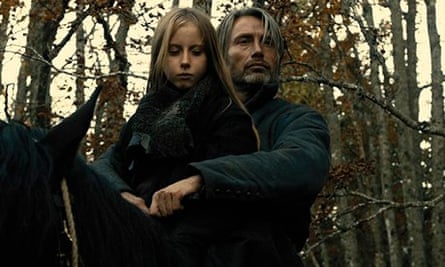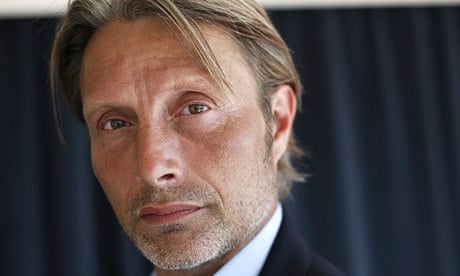Mads Mikkelsen, as handsome as you like, lowers himself into a seat, rolls a cigarette and stares handsomely out over the sea. Did I mention he was handsome? Not only is he wearing the kind of shiny suit that only the handsomest among us can get away with, he's also sporting a radioactive tan that sets off his handsomely glittering eyes. The tan, he says, is because he's just come back from shooting a western in South Africa, not, I'm relieved to discover, the latest manifestation of the World Conspiracy of Handsomeness.
Oh well. It's safe to say that the way Mikkelsen, 48, looks has not hurt him in his quest to become a well-known and successful actor. But the guy can act, too. Take, for example, the 2002 film Open Hearts, where he plays a sensitive hospital doctor (fantastically handsome, of course) who conducts an extramarital affair with the rather good-looking young fiancee of a severely disabled patient. Put together in Danish director Susanne Bier's trademark workshopped style, Open Hearts is immoderately affecting, with Mikkelsen serving up a detailed and intelligent study of a (handsome) man in crisis.
Mikkelsen is Danish as well, and a key figure in the extraordinary generation of Danish film-makers that has loomed large over world cinema since the mid-90s. He got his big acting break from Nicolas Winding Refn, playing a drug dealer in Refn's first film Pusher; they then followed it up with Pusher II, Bleeder and the Viking yarn Valhalla Rising. Bier, an Oscar-winner with In a Better World, cast Mikkelsen in 2006's After the Wedding, as well as Open Hearts. Thomas "Festen" Vinterberg put him in vigilante-justice nailbiter The Hunt, and he duly won the best actor award at Cannes in 2012.
Mikkelsen thinks back to his early days with Refn, turning up at Cannes with Bleeder ("a very beautiful film of Nicolas's but no one was interested in it"). "We were so ambitious," he says. "We didn't know anyone, we had no connections, we stood around overdressed in big boots and jackets, and we felt like idiots. At the same time we thought: fuck 'em. We've made a cool film, and when we go back home we'll do another one. We had the attitude."
Oddly enough, Mikkelsen's best known role – at least, up until The Hunt – was the complete opposite of these: Le Chiffre in the first Daniel Craig 007 film, Casino Royale. He's alive to the irony: never having previously seen a Bond film himself, he got the call after producer Barbara Broccoli was knocked out by Open Hearts. "For some strange reason she could imagine my soft doctor to be a bad guy."
Mikkelsen isn't above doing a chunk of heavyweight American TV either: he's currently playing Hannibal Lecter in the NBC series Hannibal. ("He's one of the happiest men I've ever played; he really enjoys life.")
So did this golden generation simply materialise from the ether? Mikkelsen says simply: "It came out of necessity." There must have been more to it than that? "It was a whole generation who were in love with Mean Streets and Taxi Driver but we had no idea why nothing remotely like that was done in Denmark." He gives due credit to Lars von Trier, "the big player". "He was very arrogant about what he wanted to do. Nobody could interfere. He inspired a lot of young directors to think: I am not going to listen to the producers, I am going to make my film. Out of that come a lot of shit films, but also some fantastic ones."

Of all Denmark's high-achieving directors, Von Trier is the only one yet to cast Mikkelsen. I assume it's because Mikkelsen is too canny and self-aware to allow himself to be on the receiving end of Von Trier's special brand of actor-exploitation, but Mikkelsen seems almost hurt when the gap on his CV is mentioned. "No," he says, temporarily taken aback, "I've never worked with him." Would he want to? "Yeah, for sure, if it was interesting."
Von Trier tends to like actors desperate to prove something, or those beyond caring. Mikkelsen, you sense, is neither of these. He talks about his new film, directed by Frenchman Arnaud des Pallières, which appears to have somewhat baffled those attempting to sell it to audiences. Premiering at Cannes under the title Michael Kohlhaas, it now goes by the name of Age of Uprising, and its artwork suggests Mikkelsen is some sort of sword-wielding Viking avenger, a la Valhalla Rising. In fact, it's an adaptation of a Heinrich von Kleist novella, originally set in Reformation-era Saxony but now transposed to 16th-century France. Mikkelsen does carry a big sword, but doesn't do much fighting.
The film was clearly a challenge: not only did he have to act in French, a language of which he had little knowledge, and spend most of his acting time wrangling a herd of horses, but des Pallières proved no pushover either. "He was the first director who rejected all my ideas from the very beginning. I kept asking him: why me, why not a French guy who can ride? His answers were quite radical – he had a vision for the film, a very strong one, and the film was radical and the character was radical. So I took the role and said: 'I will do my very, very best to learn French.'"
"Radical" would seem to be one of Mikkelsen's favourite words. But it's apparent that this inquisitiveness, coupled with the desire to impose something of himself on the authorship of a film, is a big part of what he does, another habit learned in Denmark. "It was a tradition for my generation that we all work together on a project. I did it with Anders Thomas Jensen, as well as Susanne [Bier]. Pusher II was a big collaboration between me and Nicolas [Refn].
"I fancy myself at being pretty good at understanding a script and finding the weaknesses, and then making them more radical than they are. People tend to listen to me. Except Arnaud."
The Age of Uprising is released on 3 Jan

Comments (…)
Sign in or create your Guardian account to join the discussion